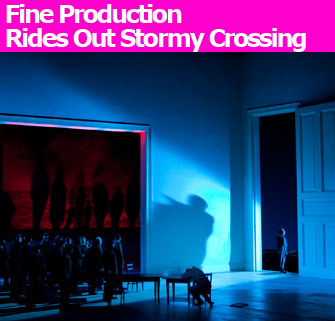 |
|
Erik (Klaus Florian Vogt) bows his head in grief while the Dutchman (James Morris) watches from the doorway. Photo © Opéra National de Paris/Frédérique Toulet |
In the program notes for the current production of Richard Wagner’s The Flying Dutchman (Le Vaisseau Fantôme) at the Opéra Bastille, we are told that the first Paris performance of the opera took place in 1937, almost a century after it was written, but there is no mention of the fact that a penniless Wagner wrote the opera while in Paris, only to see it turned down by the Paris Opéra in 1841. I am pleased to report that Willy Decker’s visually stunning and beautifully lit reprise of his 2000 production goes some way toward making up for that early lapse of judgment.
The names of Senta, Daland and Erik are so indelibly associated with Wagner’s music for The Flying Dutchman that it always amuses me to remember that Wagner changed the setting of the opera from Scotland to Norway at the very last minute (inspired, it is said, by a particularly rocky boat trip through Norwegian waters). Otherwise, we would have been left with the far less memorable names of Anna, Donald and George.
Putting aside the rather dubious sexual politics of The Flying Dutchman (the father is willing to sell his daughter to a rich man he has just met during a storm, and the daughter seems all too happy to sacrifice herself to the match), there is much to admire about the opera. Wagner found himself at a fascinating musical crossroads while writing the piece, at a moment when he was moving away from more traditional romantic opera toward the extraordinary sound world and conception of his later musical dramas (such as the Ring Cycle, Tristan und Isolde and Parsifal). The Flying Dutchman includes many traditional elements (such as set-piece duets) but also strong indications of leitmotif-based music that closely connects musical themes to characters and events in the opera.
For this production, two of the great modern Wagnerian basses, James Morris and Matti Salminen, play the roles of the Dutchman and Daland respectively. Morris has sung the part of Wotan in all the top opera houses of the world, and Salminen is perhaps the definitive King Mark on stage and on disc. Both are now coming to the end of their careers, however, and, unfortunately, it shows at certain moments, particularly in James Morris’s uneven intonation. That said, the strong stage presence and glorious power of these two singers make the occasional vocal blemish forgivable.
Adrianne Pieczonka as Daland’s daughter, Senta, is undoubtedly the star of the evening, singing and acting with shattering intensity. She must be at or near her vocal peak right now, and I would recommend this production for her performance alone. As her hard-done-by suitor Erik, Klaus Florian Vogt grows into the role as the evening progresses and seems believably aggrieved as he fights for Senta’s love. Of the other singers, it is worth mentioning the tenor Bernard Richter as the Helmsman: a great Wagnerian heldentenor of the future, perhaps?
Productions of The Flying Dutchman often stand or fall on the standard of choral singing, as Wagner places great responsibility on the men and women choruses throughout the opera: fortunately, the Chorus of the Opéra National de Paris rises magnificently to the occasion. The superb playing of the orchestra, conducted by Peter Scheider, adds to what is a more than satisfying musical performance. How do the horn players manage to play for nearly two and a half hours without an interval and not fluff a single note?
Opéra National de Paris: Place de la Bastille, 75012 Paris. Métro: Bastille. Tel.: 0 892 89 90 90 or + 33 (0)1 71 25 24 23 (from abroad). Remaining performances: September 21, 24, 27, 30, October 6, 9 at 7.30pm; October 3 at 2:30pm. Tickets: €5-€140. www.operadeparis.fr
Support Paris Update by ordering music by Wagner from Paris Update’s Amazon store at no extra cost. Click on your preferred Amazon location: U.K., France, U.S.
Buy other music and books from the Paris Update store: U.K., France, U.S.
Reader Reaction: Click here to respond to this article (your response may be published on this page and is subject to editing).
© 2010 Paris Update
Favorite